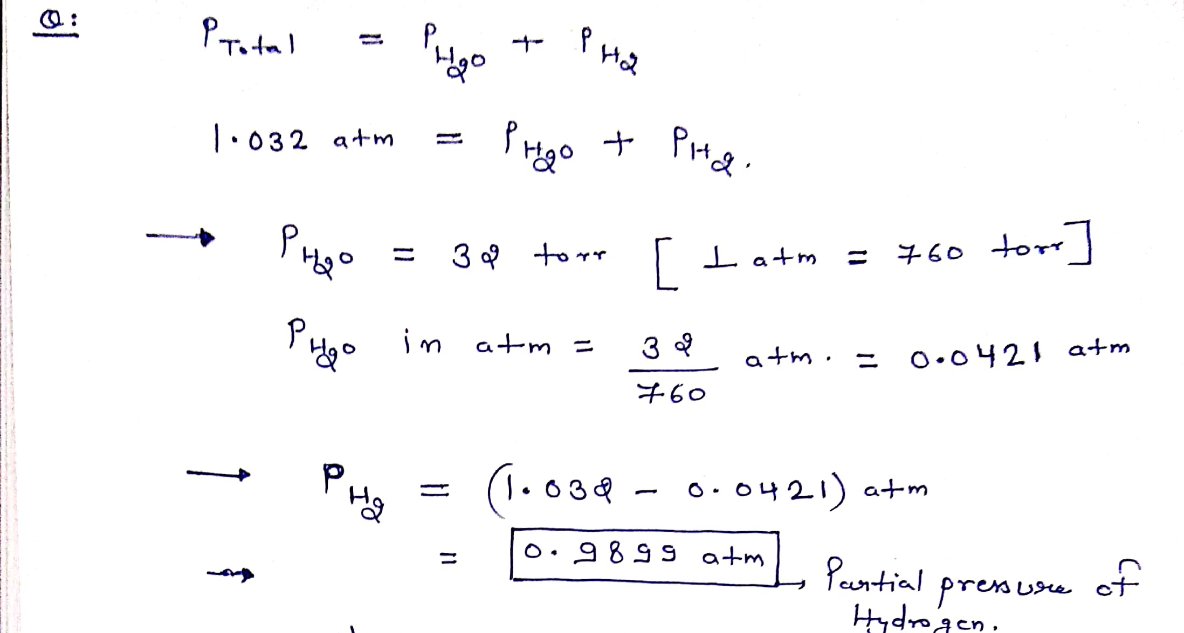Small quantities of hydrogen gas can be prepared in the laboratory by the addition of aqueous hydrochloric acid to metallic zinc. Zn (s) + 2 HCl (aq) ZnCl2(aq) + H2(g) Typically, the hydrogen gas is bubbled through water for collection and becomes saturated with water vapor. Suppose 240.0 ml of hydrogen gas is collected at 30. ⁰C and has a total pressure reading of 1.032 atm by this process. a)What is the partial pressure of hydrogen gas in this sample? (The vapor pressure of water at this temperature equals to 0.042atm) b)Calculate how many moles of Hydrogen was produced? R= 0.08206 L.atm/mol.K c)How many grams of Znmust have reacted to produce this quantity of hydrogen gas? (Molar mass of Zn = 65.4 g/mol)
Ideal and Real Gases
Ideal gases obey conditions of the general gas laws under all states of pressure and temperature. Ideal gases are also named perfect gases. The attributes of ideal gases are as follows,
Gas Laws
Gas laws describe the ways in which volume, temperature, pressure, and other conditions correlate when matter is in a gaseous state. The very first observations about the physical properties of gases was made by Robert Boyle in 1662. Later discoveries were made by Charles, Gay-Lussac, Avogadro, and others. Eventually, these observations were combined to produce the ideal gas law.
Gaseous State
It is well known that matter exists in different forms in our surroundings. There are five known states of matter, such as solids, gases, liquids, plasma and Bose-Einstein condensate. The last two are known newly in the recent days. Thus, the detailed forms of matter studied are solids, gases and liquids. The best example of a substance that is present in different states is water. It is solid ice, gaseous vapor or steam and liquid water depending on the temperature and pressure conditions. This is due to the difference in the intermolecular forces and distances. The occurrence of three different phases is due to the difference in the two major forces, the force which tends to tightly hold molecules i.e., forces of attraction and the disruptive forces obtained from the thermal energy of molecules.
Small quantities of hydrogen gas can be prepared in the laboratory by the addition of aqueous hydrochloric acid to metallic zinc.
Zn (s) + 2 HCl (aq) ZnCl2(aq) + H2(g)
Typically, the hydrogen gas is bubbled through water for collection and becomes saturated with water vapor. Suppose 240.0 ml of hydrogen gas is collected at 30. ⁰C and has a total pressure reading of 1.032 atm by this process.
a)What is the partial pressure of hydrogen gas in this sample? (The vapor pressure of water at this temperature equals to 0.042atm)
b)Calculate how many moles of Hydrogen was produced? R= 0.08206 L.atm/mol.K
c)How many grams of Znmust have reacted to produce this quantity of hydrogen gas? (Molar mass of Zn = 65.4 g/mol)

Trending now
This is a popular solution!
Step by step
Solved in 3 steps with 3 images









